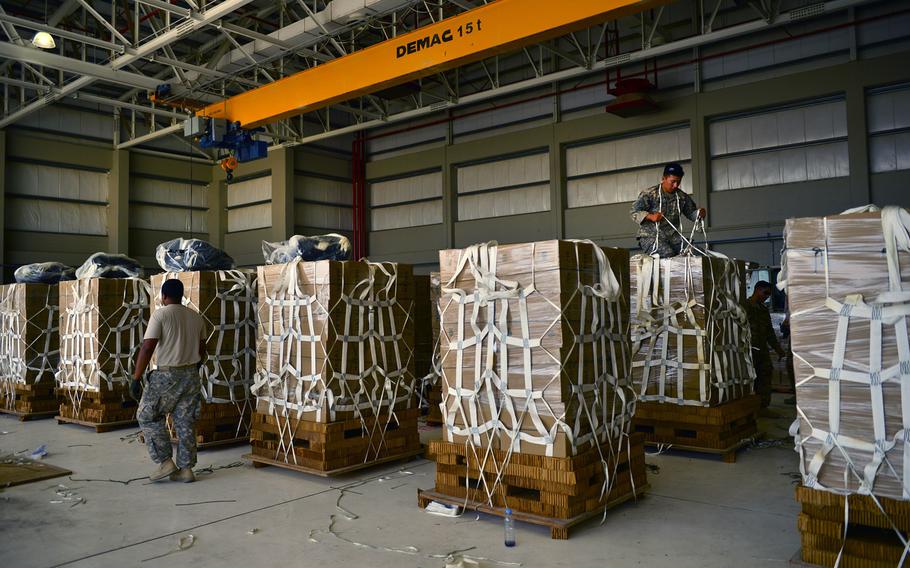Middle East
Hagel at Camp Pendleton: 130 more US troops deployed to Iraq
Stars and Stripes August 13, 2014

U.S. Army parachute riggers with the 11th Quartermaster Company, 264th Combat Sustainment Support Battalion, 82nd Sustainment Brigade palletize halal meals for a humanitarian airdrop Aug. 7, 2014, at an undisclosed location in Southwest Asia. (Vernon Young Jr./U.S. Air Force)
CAMP PENDLETON, Calif. — The United States has sent 130 new military personnel to northern Iraq to review the situation in the volatile area where thousands of Iraqi civilians are trapped by fighting between Iraqi Kurds and Islamic State militants.
Secretary of Defense Chuck Hagel told a group of Marines here that the team, which arrived Tuesday in Irbil, was “not a combat-boots-on-the-ground operation” and that the American combat role in Iraq is over.
In Washington, a defense official said the team, which includes Marines and special operators, would look into ways to help thousands trapped on Mount Sinjar and prevent “potential acts of genocide” by the Islamic State. They will work closely with State Department and USAID to coordinate plans, the official said in a statement.
Hagel emphasized that the new deployment was temporary and its members will “take a closer look and give a more in-depth assessment of where we can continue to help the Iraqis with what they’re doing and the threats that they are now dealing with.”
Last week, the U.S. military began airstrikes against Islamic State fighters threatening civilians, including minority Yazidis and Christians, and to prevent the Islamic State from threatening the Iraqi Kurdish capital of Irbil where the U.S. maintains a diplomatic presence.
The U.S. and several other countries have also dropped food and water to civilians trapped on Mount Sinjar, where they fled after Islamic State fighters overran their towns and villages.
The U.S. already has 250 military advisers working with security forces in Iraq, as well as 455 U.S. security forces and 100 military personnel at the U.S. Embassy in Baghdad.
Hagel addressed the 200 Marines during a town hall meeting in an aircraft hangar at the base’s air station Tuesday afternoon at the end of a round-the-world trip that has taken him to Germany, India and Australia. The Marines in the audience are part of I Marine Expeditionary Force and 1st Marine Division, units that were an integral part of the push into Baghdad in 2003 and many key battles in Iraq.
I MEF units have also been heavily involved in operations in Afghanistan.
Hagel acknowledged the Marines’ accomplishments in Iraq and Afghanistan . He said that although “challenges and threats and concerns” remain in Afghanistan, the troops should recognize the progress they’ve made.
Hagel said the U.S. helped the Iraqis build a stable government and country to “determine their own future,” but “the Iraqi government really squandered the opportunity the past five years to build an inclusive government.” That, he said, has led to the situation today.
During a class he attended for those preparing to leave the military, he told Marines they should not underestimate their judgment and leadership experience when looking for civilian jobs.
“There’s no higher priority for me and for our leaders … than to take care of [our] people and their families,” he said.
Stars and Stripes reporter Jon Harper contributed to this report from the Pentagon
hlad.jennifer@stripes.comTwitter: @jhlad.